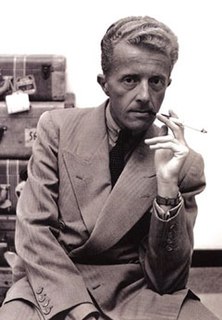A Quote by George Pattison
Perhaps this is an area where every generation starts from scratch. Although the crisis of the First World War inaugurated an especially strong period of disillusion with regard to the optimism of the previous age, the pattern has repeated itself in many ways in more recent times, e.g., the loss of faith in politics as a means of advancing human well-being. And perhaps this also has to do with basic elements in growing up.
Quote Topics
Advancing
Age
Also
Although
Area
Basic
Being
Crisis
Disillusion
Elements
Every
Faith
First
First World
First World War
Generation
Growing
Growing Up
Human
Itself
Loss
Loss Of Faith
Many
Means
More
Optimism
Pattern
Perhaps
Period
Politics
Previous
Recent
Regard
Repeated
Scratch
Starts
Strong
Times
Up
War
Ways
Well
Well-Being
World
World War
World War I
Related Quotes
She couldn't think of anyone else who remotely resembled him. He was complicated, almost contradictory in so many ways, yet simple, a strangely erotic combination. On the surface he was a country boy, home from war, and he probably saw himself in those terms. Yet there was so much more to him. Perhaps it was the poetry that made him different, or perhaps it was the values his father had instilled in him, growing up. Either way, he seemed to savor life more fully than others appeared to, and that was what had first attracted her to him.
Because we don't know when we will die, we get to think of life as an inexhaustible well. Yet everything happens only a certain number of times, and a very small number really. How many more times will you remember a certain afternoon of your childhood, an afternoon that is so deeply a part of your being that you can't even conceive of your life without it? Perhaps four or five times more, perhaps not even that. How many more times will you watch the full moon rise? Perhaps 20. And yet it all seems limitless.
If the world is to contain a public space, it cannot be erected for one generation and planned for the living only; it must transcend the life-span of mortal men…. There is perhaps no clearer testimony to the loss of the public realm in the modern age than the almost complete loss of authentic concern with immortality, a loss somewhat overshadowed by the simultaneous loss of the metaphysical concern with eternity.
The people of the United States have been fortunate in many things. One of the things in which we have been most fortunate has been that so far, due perhaps to certain basic virtues in our traditional ways of doing things, we have managed to keep the crisis of western civilization, which has devastated the rest of the world and in which we are as much involved as anybody, more or less at arm's length.
Of course there are many films about the period of Fascism itself but I don't know of any about that period beforehand. But it wasn't that specific fact that they weren't there that got me to think about this in the first place. It's not what led to the basic idea for the film, although it became apparent when I began to think about it.
Perhaps, after all, romance did not come into one’s life with pomp and blare, like a gay knight riding down; perhaps it crept to one’s side like an old friend through quiet ways; perhaps it revealed itself in seeming prose, until some sudden shaft of illumination flung athwart its pages betrayed the rhythm and the music, perhaps . . . perhaps . . . love unfolded naturally out of a beautiful friendship, as a golden-hearted rose slipping from its green sheath.
I also came to see that liberalism's superficial optimism concerning human nature caused it to overlook the fact that reason is darkened by sin. The more I thought about human nature the more I saw how our tragic inclination for sin causes us to use our minds to rationalize our actions. Liberalism failed to see that reason by itself is little more than an instrument to justify man's defensive ways of thinking. Reason, devoid of the purifying power of faith, can never free itself from distortions and rationalizations.
The basic problem is not political, it is apolitical and human. One of the most important things to do is to keep cutting deliberately through political lines and barriers and emphasizing the fact that these are largely fabrications and that there is another dimension, a genuine reality, totally opposed to the fictions of politics: the human dimension which politics pretend to arrogate entirely to themselves. This is the necessary first step along the long way toward the perhaps impossible task of purifying, humanizing and somehow illuminating politics themselves.
It is our destiny to live with the wrong as well as the right kind of citizens, and to learn from them, the wrong-minded ones, as much or more as from others. If we have not yet succeeded -after how many centuries?- in eliminating from life the elements which plague us perhaps we need to question life more closely. Perhaps our refusal to face reality is the only ill we suffer from, and all the rest but illusion and delusion. (p.26)
Marriage means handing over yourself, your body, your future, your keeping to the one whom you dearly love, although this person may, in many ways, remain a stranger. This tremendous act of faith is something that can unlock in each lover powers of compassion, generosity, joy, passion, fidelity and hope that no one guessed was even there. That is why the confidence of young lovers is not foolish or arrogant, but an expression of a basic fact in human experience that the greatest of human gifts are set to work only when people are prepared to risk everything and first you risk it before God.

































